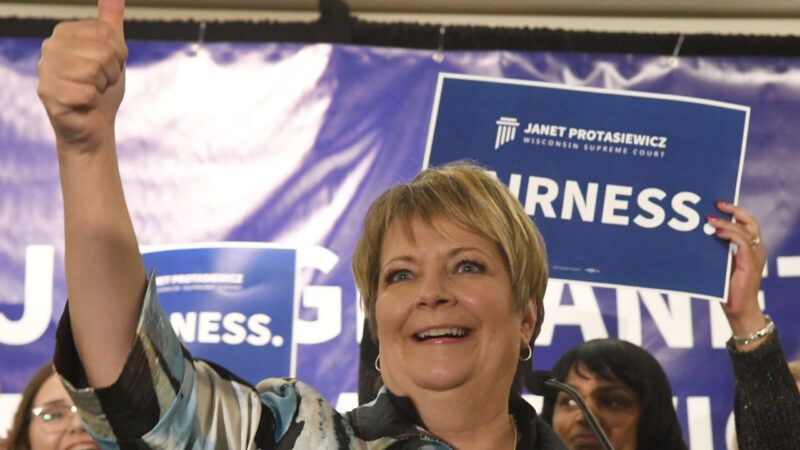Progressive-Backed Candidate Wins Seat on Wisconsin's Supreme Court
Abortion and gerrymandering are likely to be on the court's docket in the near future, and Janet Protasiewicz ran unabashedly to the left on both issues. Is this the best way to decide contentious topics?

On Tuesday, the biggest political story in the country was clear: former President Donald Trump's indictment on 34 counts of business fraud. But on the same day, Wisconsites elected Milwaukee County Judge Janet Protasiewicz as the newest justice on the state Supreme Court. Protasiewicz, a liberal, defeated conservative Dan Kelly, a former state Supreme Court justice, by 11 points. The results could have major ramifications for policy in the state going forward, but it's worth wondering whether that's a good thing.
The Wisconsin Supreme Court has seven justices who serve 10-year terms, elected by statewide vote on a nonpartisan ticket. Conservative justices currently outnumber liberals on the court 4–3 and have held a majority in some form for 15 years. But when conservative Justice Patience Roggensack announced in December 2021 that she would not seek reelection, both progressives and conservatives poured money into the race to replace her. Total spending on the race topped $45 million ahead of election day. CBS News called the race "the most expensive election of its kind ever."
The race also garnered a lot of attention. CNN said it was "the most consequential election of the year." The New York Times podcast The Daily posited that the race "could reshape Wisconsin, and the country." Ben Wikler, chair of Wisconsin's Democratic Party, said it was "the most important election that nobody's ever heard of."
The level of attention stems from a pair of issues the state's judiciary could soon rule on.
Wisconsin has some of the most gerrymandered electoral maps in the country, stemming from its 2011 redistricting. Despite Gov. Tony Evers, a Democrat, winning election in both 2018 and 2022, Republicans dominate both houses of the state Legislature. Princeton University's independent Gerrymandering Project gives the state an F, citing a "significant Republican advantage." The Legislature drafted the maps currently in use, and the state Supreme Court ratified them last year.
But a new majority could change that. University of Wisconsin-Madison law professor and redistricting expert Rob Yablon told Wisconsin Public Radio that if the court shifted in a more progressive direction, litigants "would almost certainly try to bring a case." Given the justices' 10-year terms, Protasiewicz would have control over not only the current maps but also the maps drawn after 2030.
The court is also likely to weigh in on abortion. The 2022 U.S. Supreme Court decision Dobbs v. Jackson Women's Health Organization functionally overturned the national right to an abortion, giving way to a patchwork of state laws. Most states either explicitly allowed the practice or else enacted "trigger laws," by which an abortion ban would automatically go into effect if Roe v. Wade (1973) were ever overturned.
Wisconsin exists in a gray area between those two scenarios. An 1849 state law forbids the practice, deeming it "manslaughter in the first degree." But as the Milwaukee Journal Sentinel wrote last year, "Some legal experts believe subsequent abortion statutes repealed the original 1849 law." Lester Pines, an attorney representing Planned Parenthood in litigation on the law, told the paper, "I don't know if (the state abortion ban) is enforceable or not."
Amid all that legal uncertainty, Wisconsin clinics stopped performing elective abortions after the Dobbs decision. Short of an outright repeal, a judicial ruling is likely the only thing that could bring clarity to the issue.
On each of these subjects, Protasiewicz was outspoken. She told a candidate forum in January, "Let's be clear here: The maps are rigged." And she made abortion a centerpiece of her campaign, saying in ads, "I believe in a woman's freedom to make her own decision on abortion." She cast her opponent as an "extreme partisan" who would uphold the 1849 ban while not saying definitively how she would vote if it came before her.
Notably, this is not even the first time that abortion has factored into a recent Wisconsin election. Last year's race for state attorney general could be seen as a proxy vote on abortion access, as incumbent Josh Kaul ran for reelection promising not to investigate or prosecute violations of the 1849 law, while his Republican opponents pledged to uphold the law as written. (Kaul ultimately won by 1.4 points.)
But Tuesday's election demonstrates the wrong way to fight over politically contentious topics. Legislatures make laws while the judiciary interprets laws. The ideal forum for hashing out differences over legislation is in the actual legislature, not in running judicial candidates who are most likely to rule on those laws in the way you prefer.


Show Comments (85)